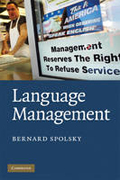
Language policy is all about choices. If you are bilingual or plurilingual, you have to choose which language to use. Even if you speak only one language, you have choices of dialects and styles. Some of these choices are the result of management, reflecting conscious and explicit efforts by language managers to control the choices. This is the first book to present a specific theory oflanguage management. Bernard Spolsky reviews current research on the family, religion, the workplace, the media, schools, legal and health institutions, the military and government. Also discussed are language activists, international organisations, and human rights relative to language, and the book concludeswith a review of language managers and management agencies. A model is developed that recognises the complexity of language management, makes sense of the various forces involved, and clarifies why it is such a difficult enterprise. INDICE: 1. Towards a theory of language management; 2. Managing language in the family; 3. Religious language policy; 4. Language management in the workplace - managing business language; 5. Managing public linguistic space; 6. Language policy in schools; 7. Managing language in legal and health institutions; 8. Managing military language; 9. Local, regional and national governments managing languages; 10. Influencing language management - language activist groups; 11. Managing languages at the supranational level; 12. Language managers, language management agencies and academies, and their work; 13. A theory of language management: postscript or prolegomena.
- ISBN: 978-0-521-73597-1
- Editorial: Cambridge University
- Encuadernacion: Rústica
- Páginas: 308
- Fecha Publicación: 01/04/2009
- Nº Volúmenes: 1
- Idioma: Inglés
